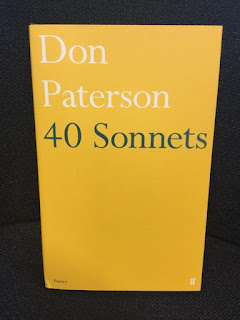 |
| Don Paterson, illustration by Joe Ciardiello |
In 101 Sonnets: From Shakespeare to Heaney (1999), Don Paterson set about showcasing the sonnet’s rich history. But his anthology’s enduring popularity has had as much to do with its clever, entertaining and controversial introduction. Even at this early stage in his career as poet and commentator, Paterson is found arguing for the sonnet as “one of the greatest achievements of human ingenuity”, a “box for . . . dreams” which “represents one of the most characteristic shapes human thought can take”. By turns convincing and indulgent, his thesis is grounded in the unifying and sense-making powers of rhyme and metre; the sonnet’s loose adherence to the proportions of the golden section; and his deep admiration for what the best sonneteers can do with this little “squared circle”, a resistant medium which allows poets to “trick a logic from the shadows” of unconscious thought. Much like his recent layman’s guide Reading Shakespeare’s Sonnets (reviewed in the TLS, January 14, 2011), it makes for compelling reading, not least since Paterson’s fascination is also that of the practitioner. From Nil Nil (1993) with its studies in desolation and aftermath, to the serious play with personae in God’s Gift to Women (1997) and the existential hymns for the poet’s twin sons in Landing Light (2003), the sonnet abounds throughout Paterson’s oeuvre.
So a new collection comprised entirely of fourteen-liners comes as little surprise. Moreover, after the austere undertaking of Paterson’s last volume, Rain (2009), a bleak book that ingeniously examined the project of elegy, but also that of language and humanity, the poet must have been on the lookout for a more various way back into writing verse. And in 40 Sonnets, Paterson certainly illustrates the form’s versatility. Delivering exactly what it promises, it is an especially slight collection, even from an author known for championing brevity. But where many of his contemporaries exhibit a worrying trend towards publishing books that far surpass 40 Sonnets in length, Paterson’s icy intelligence, imagination and painstaking craft make for disproportionately substantial reading:
I must quit sleeping in the afternoon.
I do it for my heart, but all too soon
my heart has called it off. It does not love me.
If it downed tools, there’d soon be nothing of me.
Its hammer-beat says you are, not I am.
It prints me off here like a telegram.
What do I say? How can the lonely word
know who has sent it out, or who has heard?
From the everyday setting of an afternoon nap to intimations of mortality, “Here” offers a meditation on identity as linguistic gesture. Paterson delivers all this in crisp and exact language, finding heart-thumping end rhymes that feel anything but forced. It is this command of syntax combined with lucid philosophical thinking that has come to define Paterson’s poetry. A similar spirit of questing and questioning makes for some of the best sonnets in this book. “Souls” takes the numinous aspects of our selves and expresses them as an aberration from the physical, a world where “space is stone, and time a breackneck terror”; in “The Air”, the element we take for granted becomes a mysterious abstraction, “an empty datastream” that is “nowhere” and “never”, a powerful reminder that we are but a brief chapter in the universe’s narrative. Poems such as these have raised Paterson’s stature to that of one of the best English-language poets currently writing. If they sometimes exhibit a slight over-earnestness, and wear their author’s European influences too heavily for certain tastes (both Antonio Machado and Rainer Maria Rilke are lingering presences), they also demonstrate the rare value of a poetry of assertion and argument – poetry as a mode of knowledge, no less.
In the end, though, it is the variety and impressive consistency of 40 Sonnets that make it such a bravura performance. “The Roundabout” is perhaps the most beautiful of Paterson’s poems to his twin sons; “Funeral Prayer” is a warm, frank yet simple elegy that one can imagine being read at many an actual service. I defy anyone to read “Mercies”, the tale of having a pet put down, without a catch in the throat. There is also the welcome return of Paterson’s cutting sense of humour, which has been in rather short supply in recent times. “Requests” and “To Dundee City Council” are particular gems: both damning indictments of the artless and inept, the former addressed to a blathering poet on stage, the latter to a council presiding over a local library where “poor folks go to die / or download porno on the free wifi”. There are misfires too: “A Powercut” is the kind of workshopped list-poem that Paterson has, in the past, quite rightly dismissed; and exactly how “The Version” – a long-winded prose piece that meanders through its Borgesian conceit of artistic paranoia and forgery – constitutes a sonnet, is beyond this correspondent’s ken. Nevertheless, 40 Sonnets remains an appealingly slender book of remarkable emotional, intellectual and tonal range, from a writer who shows that poetic form is precisely what you make of it.
Ben Wilkinson is currently writing a reader's guide to the poetry of Don Paterson, due to appear in 2017.
first published in The Times Literary Supplement
